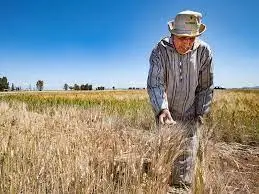No products in the cart.

Objectives of Organic Farming Why It Matters for Everyone
Objectives of Organic Farming
Organic farming isn’t just a buzzword; it’s a movement towards healthier living and sustainable agriculture. But what exactly are the objectives behind this approach to farming? Why is it gaining so much attention? In this article, we’ll dive into the goals and benefits of organic farming, explaining why it matters not just to farmers but to all of us.

Table of Contents
| Sr# | Headings |
|---|---|
| 1 | Introduction to Organic Farming |
| 2 | 1. Enhancing Soil Fertility |
| 3 | 2. Reducing Chemical Dependency |
| 4 | 3. Promoting Biodiversity |
| 5 | 4. Ensuring Animal Welfare |
| 6 | 5. Sustaining Water Resources |
| 7 | 6. Producing Healthier Food |
| 8 | 7. Strengthening Rural Economies |
| 9 | 8. Reducing Carbon Footprint |
| 10 | 9. Supporting Local Communities |
| 11 | 10. Encouraging Sustainable Practices |
| 12 | Conclusion |
| 13 | FAQs |
Introduction to Organic Farming
Organic farming is about going back to basics, focusing on methods that work in harmony with nature. Instead of relying on synthetic chemicals and genetically modified organisms (GMOs), organic farmers use natural processes and substances to grow crops and raise animals. The objective isn’t just to produce food but to do so in a way that benefits the environment, animals, and people.
1. Enhancing Soil Fertility
One of the primary goals of organic farming is to improve soil health. A thriving farming operation is built on healthy soil. Organic farmers use natural composts, manure, and cover crops to enrich the soil with essential nutrients. This not only leads to better crop yields but also ensures that the soil remains fertile for future generations.
2. Reducing Chemical Dependency
Pesticides, herbicides, and fertilisers with chemicals are frequently used extensively in conventional farming. These chemicals can harm the environment and pose risks to human health. Organic farming aims to reduce or eliminate the use of these substances by employing natural alternatives. For example, instead of using synthetic pesticides, organic farmers might introduce beneficial insects that prey on harmful pests. This approach not only protects the environment but also results in cleaner, safer food.
3. Promoting Biodiversity
Biodiversity is crucial for a healthy ecosystem. Organic farming encourages the cultivation of a variety of crops, rather than monoculture farming where only one type of crop is grown. This diversity helps to maintain a balanced ecosystem, reducing the likelihood of pest outbreaks and disease. It also supports a wider range of wildlife, from soil microorganisms to birds and mammals.
4. Ensuring Animal Welfare
Organic farming isn’t just about crops; it’s also about the animals. Ensuring that livestock is raised in humane conditions is a core objective. Organic farmers provide animals with access to the outdoors, fresh air, and a natural diet free from antibiotics and growth hormones. This not only improves the animals’ quality of life but also results in healthier meat, milk, and eggs for consumers.
5. Sustaining Water Resources
Water is a precious resource, and organic farming practices are designed to protect it. By avoiding chemical fertilizers and pesticides, organic farmers reduce the risk of water pollution. Moreover, organic farming techniques like crop rotation and cover cropping help to improve soil structure, which in turn enhances water retention and reduces erosion.
6. Producing Healthier Food
At the end of the day, one of the most important objectives of organic farming is to produce food that is healthier for consumers. Organic foods don’t include GMOs or artificial pesticides or herbicides. They also tend to have higher levels of essential nutrients, such as vitamins and antioxidants. By choosing organic, consumers can enjoy fresher, more nutritious food while supporting farming practices that are better for the environment.
7. Strengthening Rural Economies
Organic farming can play a key role in revitalizing rural communities. By focusing on sustainable practices and local markets, organic farms can create jobs and provide a stable income for families. Additionally, organic farming often involves smaller-scale operations, which can help to preserve rural traditions and ways of life.
8. Reducing Carbon Footprint
Climate change is one of the biggest challenges facing our planet, and organic farming offers a way to help mitigate its impact. Organic farming practices, such as using compost and reducing chemical inputs, can help to sequester carbon in the soil. This means that organic farming can actually reduce the amount of carbon dioxide in the atmosphere, helping to combat global warming.
9. Supporting Local Communities
When you buy organic, you’re not just getting healthier food; you’re also supporting local farmers and communities. Organic farming often focuses on local markets, reducing the need for long-distance transportation and the associated carbon emissions. This helps to keep money within the community and strengthens local economies.
10. Encouraging Sustainable Practices
Finally, organic farming is all about sustainability. It encourages practices that can be maintained over the long term without depleting natural resources or harming the environment. This includes everything from crop rotation and composting to using renewable energy sources and conserving water. By adopting these practices, organic farmers are helping to ensure that our planet remains healthy and productive for future generations.
Conclusion
Organic farming is about more than just growing food. It’s a holistic approach to agriculture that seeks to benefit the environment, animals, and people. By focusing on sustainability, organic farming helps to ensure that we can continue to produce food in a way that is healthy, humane, and environmentally friendly. Whether you’re a farmer, a consumer, or just someone who cares about the planet, organic farming offers a way to make a positive impact.
FAQs
1. What is the main goal of organic farming?
The main goal of organic farming is to produce food in a way that is sustainable, environmentally friendly, and beneficial to human health.
2. How does organic farming benefit the environment?
Organic farming benefits the environment by reducing chemical use, promoting biodiversity, improving soil health, and conserving water resources.
3. Is organic food healthier than conventional food?
Yes, organic food is generally considered healthier because it is free from synthetic pesticides, herbicides, and GMOs, and it often contains higher levels of nutrients.
4. How does organic farming support rural economies?
Organic farming supports rural economies by creating jobs, providing a stable income for farmers, and preserving traditional farming practices.
5. Can organic farming help combat climate change?
Yes, organic farming can help combat climate change by sequestering carbon in the soil, reducing greenhouse gas emissions, and promoting sustainable practices.
Go and turn on towards organic farming to save future and thire save childs:
Elevate Plant Growth with Premium Bone Powder – Buy Now!
Organic Cow Dung Compost: Transform Your Garden Naturally
Premium Humic Acid for Healthy Plants | Enhance Soil & Boost Growth
Boost Plant Growth Naturally with Mustard Cake | Organic Fertilizer
Transform Your Garden with NPK Fertilizer | Boost Growth by 30%
Premium Perlite for Enhanced Gardening | Buy Now
Live Earthworms with Enhance Your Garden (soil health)
1 Neem Khali: Unveiling the Wonders of Nature
1Transform your garden with vermiwash-buy now
1 Premium quality Vermicompost [ केचुआ खाद ]
Follow us:



